
10 Best AI Code Tools: Quick and Easy Guide (2024)
Artificial intelligence has transformed the software development process.
Developers used to spend hours debugging and optimizing code, wasting precious time and effort on unimportant tasks.
Fortunately, AI code tools are changing the game.
AI tools provide exciting new possibilities with smart solutions to automate repetitive tasks and increase productivity.
They also help brainstorm ideas and write code faster.
But with so many options available, choosing the right AI tool can be challenging.
This guide will help you choose the best AI code tool to speed up coding and improve your efficiency.
Let’s get started.
What are AI Code Tools?
AI code tools are software applications that use artificial intelligence and machine learning algorithms to help developers write, debug, and optimize code.
They are smart assistants who can perform tasks in many programming languages, smoother the entire development process.
These tools offer many features like:
- Intelligent code completion and suggestions.
- Context-aware code generation.
- Automatic bug detection and suggestions for fixes.
- AI-powered test case creation and automation.
- Code explanations, refactoring, and documentation generation.
snappify will help you to create
stunning presentations and videos.
10 Best AI Code Tools
Here’s an overview of the best AI tools to increase your workflow efficiency:
OpenAI ChatGPT
OpenAI is a major AI industry player known for its powerful GPT series.
ChatGPT is a generative AI tool for professional and personal use.
It allows you to interact with the latest language models, such as GPT-4, GPT-4o, and o1-mini.
It can generate human-like text based on context and solve complex programming tasks.
You can also translate languages, make graphics from natural language descriptions, and generate more accurate code snippets.
Key Features:
- Natural language processing and context-aware text generation.
- Generates code snippets or entire functions based on plain text description.
- Supports a wide range of programming languages and frameworks.
- Provides code explanations, improvements and debug issues.
- Interactive problem solving and content generation based on user prompts.
- You can also fine-tune models to suit your specific use case.
Use Cases:
- Technical content writing.
- Generate code from plain English.
- Complex algorithm implementation.
- Build prototypes and small applications quickly.
Pricing:
- Free for basic use.
- It costs $20 per month for GPT Plus.
Qodo
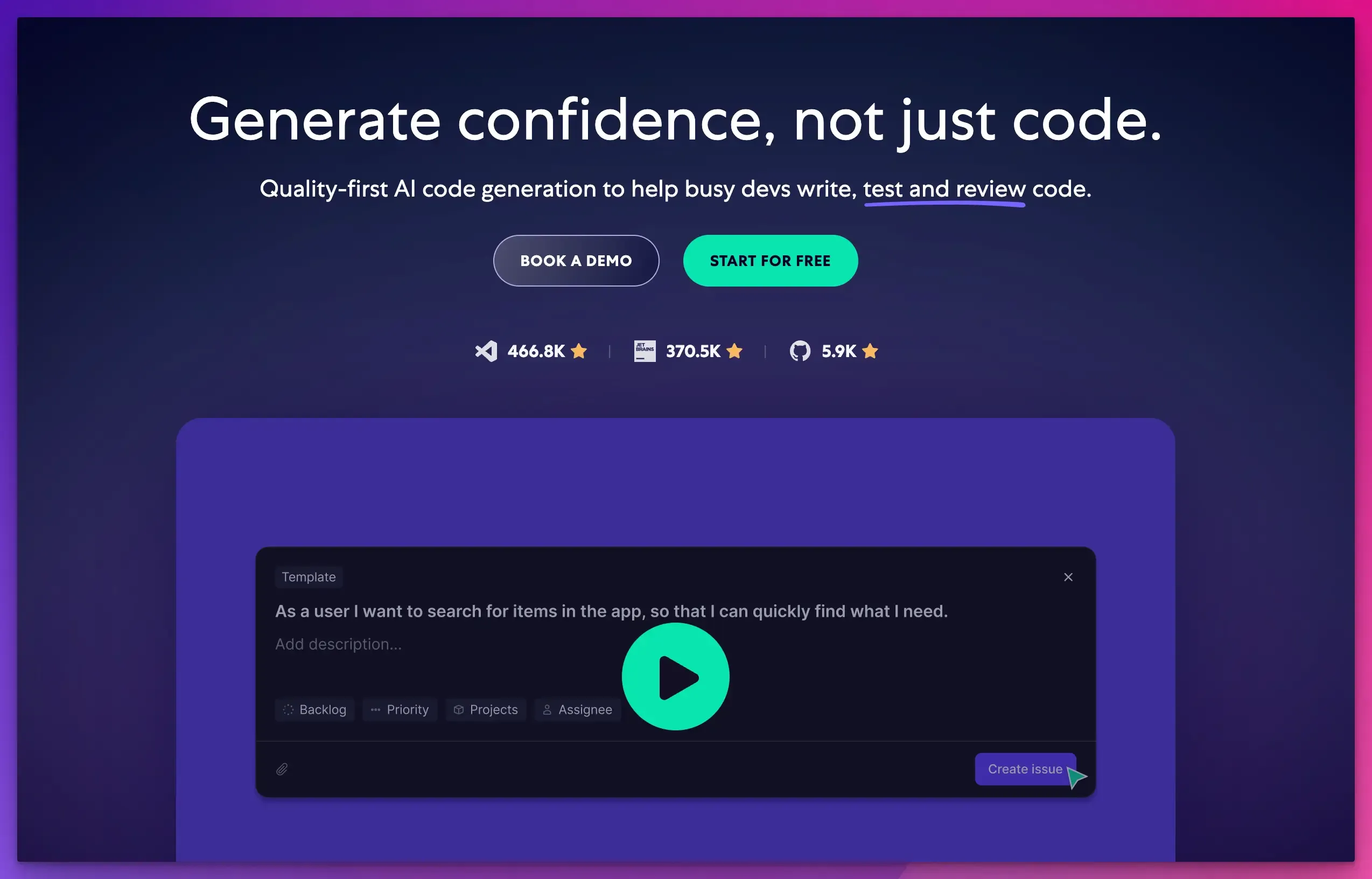
Qodo is a modern AI code generation tool that helps you write, test and review code.
It saves time by automating development tasks and making useful test suggestions directly in your IDE, allowing you to write code more confidently.
Key features:
- Context aware test generation and code suggestions ranked by severity.
- Automated code reviews to fix bugs and document code changes.
- Helps find edge cases and suspicious behaviors upon changes.
- Prioritize security by analyzing only necessary code.
- Supports multiple programming languages and git providers (Github, Gitlab).
- Integration with Visual Studio Code and JetBrains IDEs.
Use Cases:
- Accelerate development cycles by automating routine tasks.
- Maintain code quality in larger projects.
- Ideal for fast-paced Agile environments.
Pricing:
- Free plan available.
- Pricing starts from $19 per month.
Replit AI
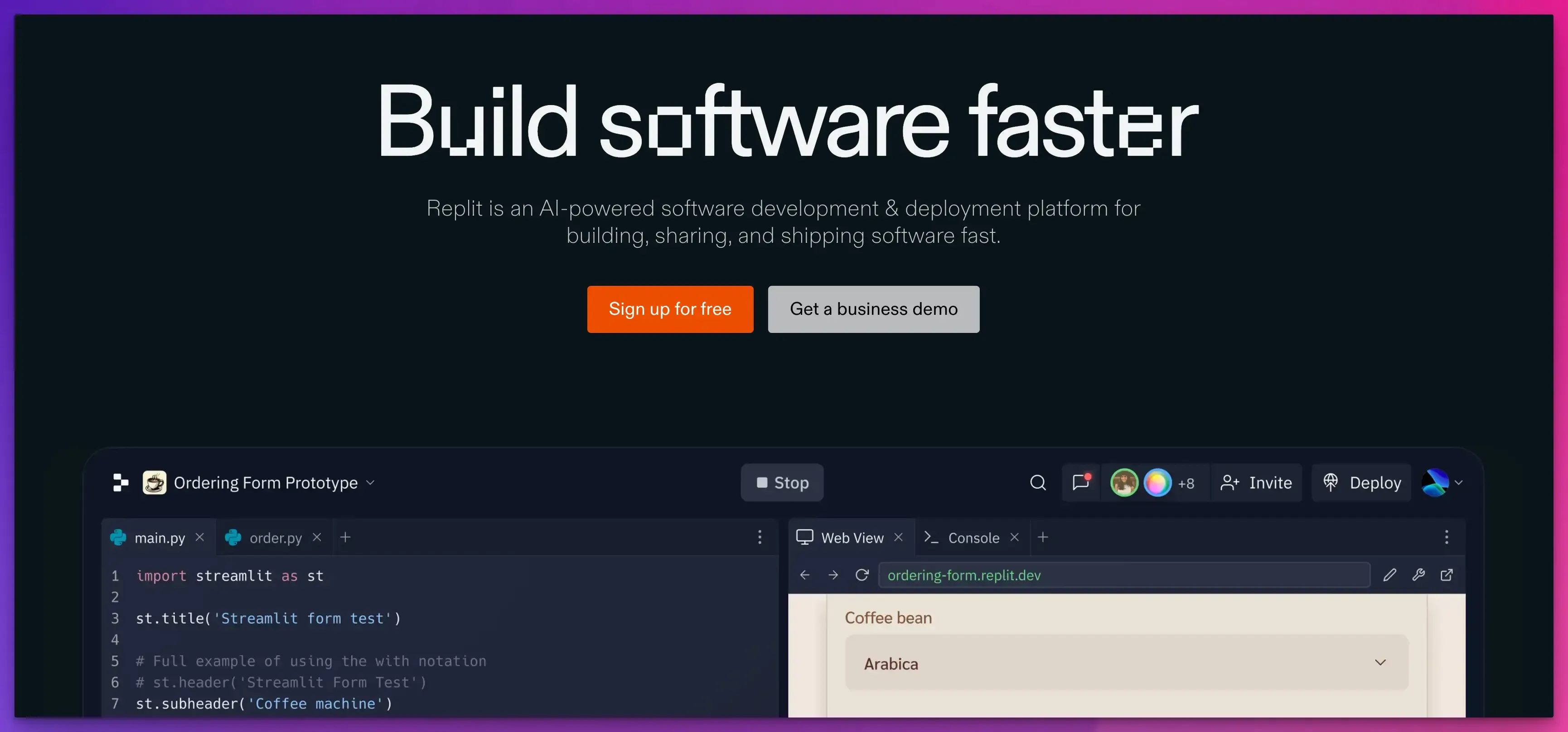
Replit AI is an AI coding assistant built into the Replit platform. It focuses on helping developers write, debug, and understand code.
Key Features:
- Autocompletes code and provides explanations based on multi-file context.
- Generates code based on your natural language prompts.
- Collaborative AI Chat for development teams working together.
- Code refactoring suggestions to modify existing code.
- Built-in debugging helps to save time.
- Supports multiple programming languages.
Use Cases:
- Easy debugging and code explanations for new developers.
- Write test cases and documentation.
- Collaborative AI-assisted coding with real-time feedback.
Pricing:
- Free plan available.
- Pricing starts from $25 per month (Replit Core).
Codeium
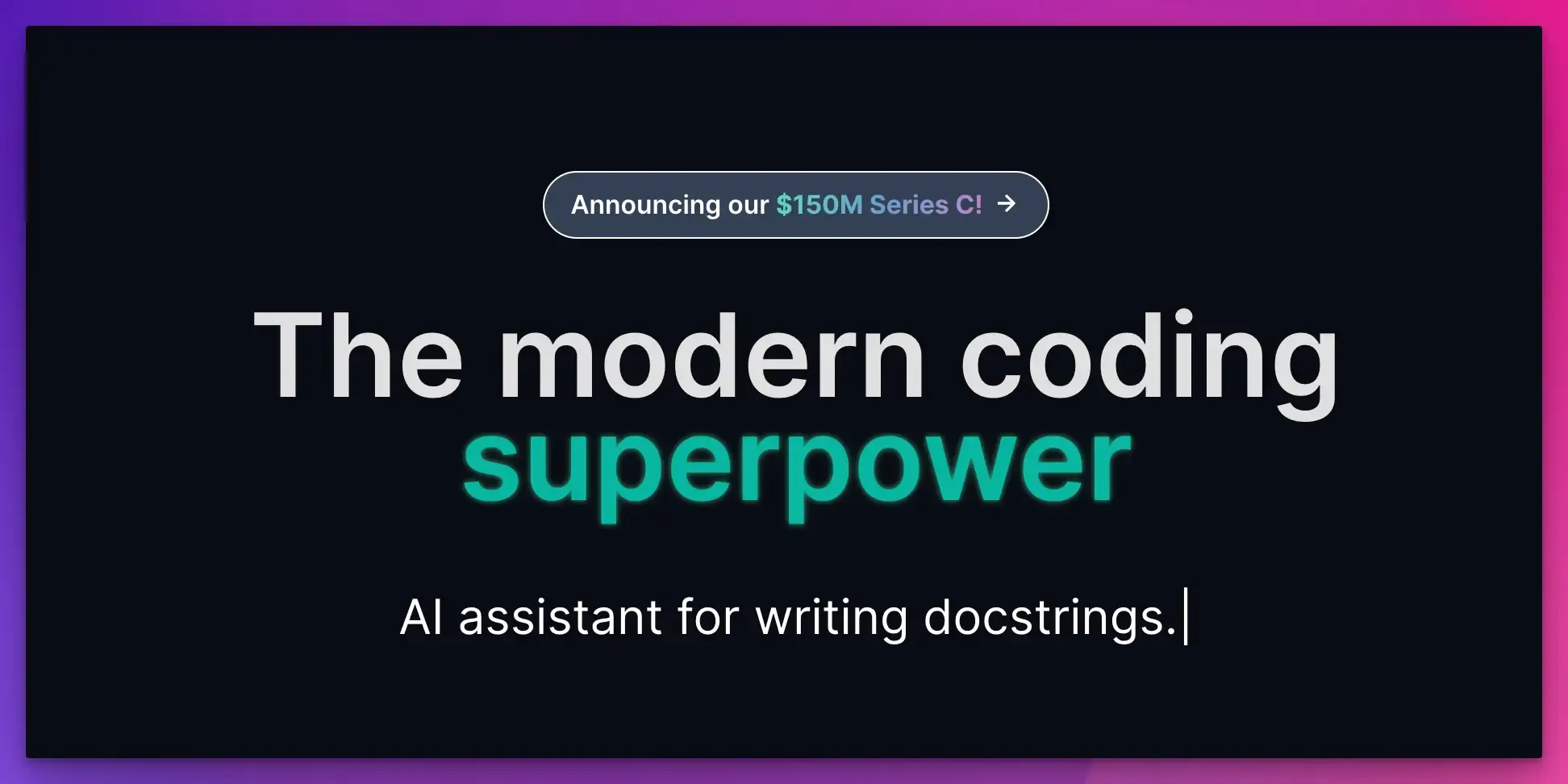
Codeium is an AI code completion tool that aims to increase developer productivity with powerful editor integration.
It offers intelligent code suggestions and autocompletion using proprietary language models specifically trained for its platform.
Key Features:
- Offers unlimited code autocompletion without a subscription.
- Context aware suggestions for improved code quality.
- Intelligent search capabilities to quickly find relevant files, classes, or methods.
- AI-powered chat provides assistance for debugging, refactoring, and documentation generation.
- Supports Java, Python, JavaScript, and other major languages.
- Works with VS Code and JetBrains IDEs.
Use Cases:
- Free alternative to GitHub Copilot.
- Students learning programming.
- Increasing speed in development.
Pricing:
- Free for individual use.
- Pricing starts from $10 per month for the pro plan.
Amazon Q

Amazon Q is a generative AI assistant developed by AWS, focusing on automating cloud-native development.
It features multistep planning and reasoning capabilities that help implement new code based on developer requests.
Key Features:
- Generates code optimized for AWS services.
- Helps write unit tests and scan for security vulnerabilities.
- Can connect to private repositories to generate personalized code recommendations.
- It supports multiple languages, including Python, Java, and JavaScript.
- Provides inline code suggestions in popular IDEs like JetBrains, IntelliJ IDEA, Visual Studio, and VS Code.
Use Cases:
- Serverless applications on AWS.
- implement new features and document code.
- Cloud application development.
- Business data analysis.
Pricing:
- Free tier with limited features.
- Pricing starts at $19 per user per month for Amazon Q Developer.
DeepCode
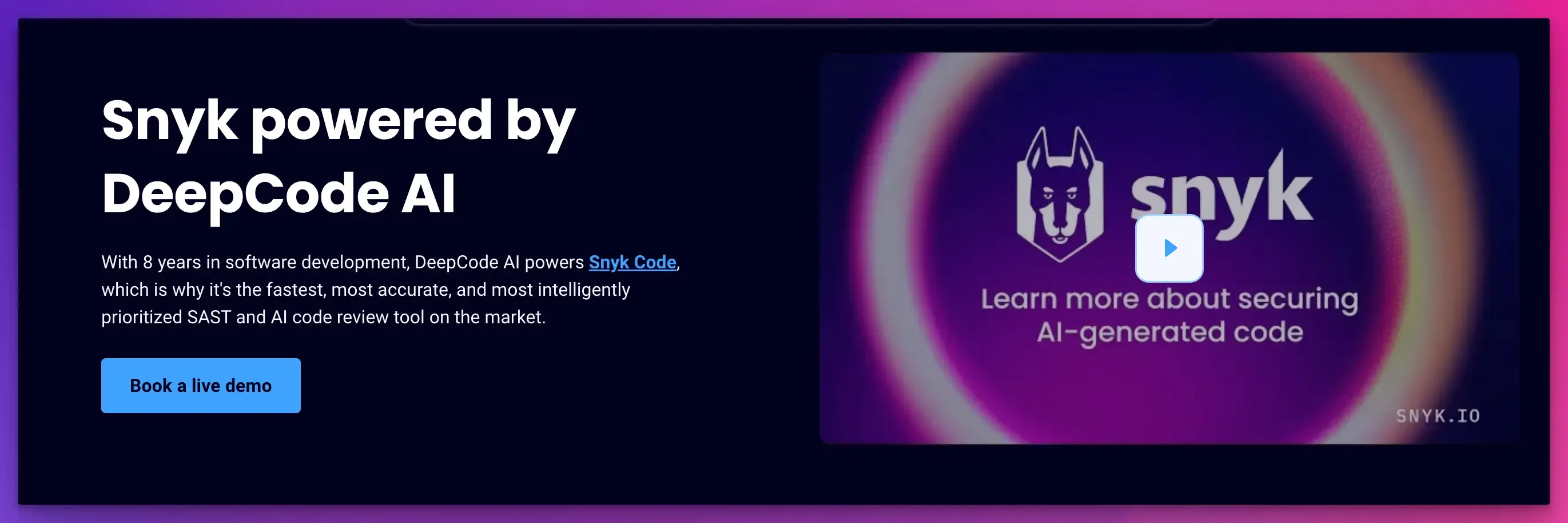
DeepCode is an AI-powered code analysis tool that automatically scans and finds vulnerabilities in codebases.
DeepCode AI powers the Snyk platform and utilizes multiple fine-tuned AI models, making security audits more efficient and enhancing data privacy.
Key Features:
- Automatically scans code for potential bugs and issues.
- Detects security vulnerabilities in real time.
- Provides auto-fix recommendations in line with the code right from the IDE.
- Support multiple languages such as Java, Python, and JavaScript.
- Integrates with CI/CD tools, including GitHub, GitLab, Bitbucket, and Azure Repos.
Use Cases:
- Identify security risks in open-source projects.
- Automatic code reviews.
- Static application security testing (SAST).
- Compliance with coding standards.
Pricing:
- Free tier available.
- Pricing starts from $25 per month.
Continue
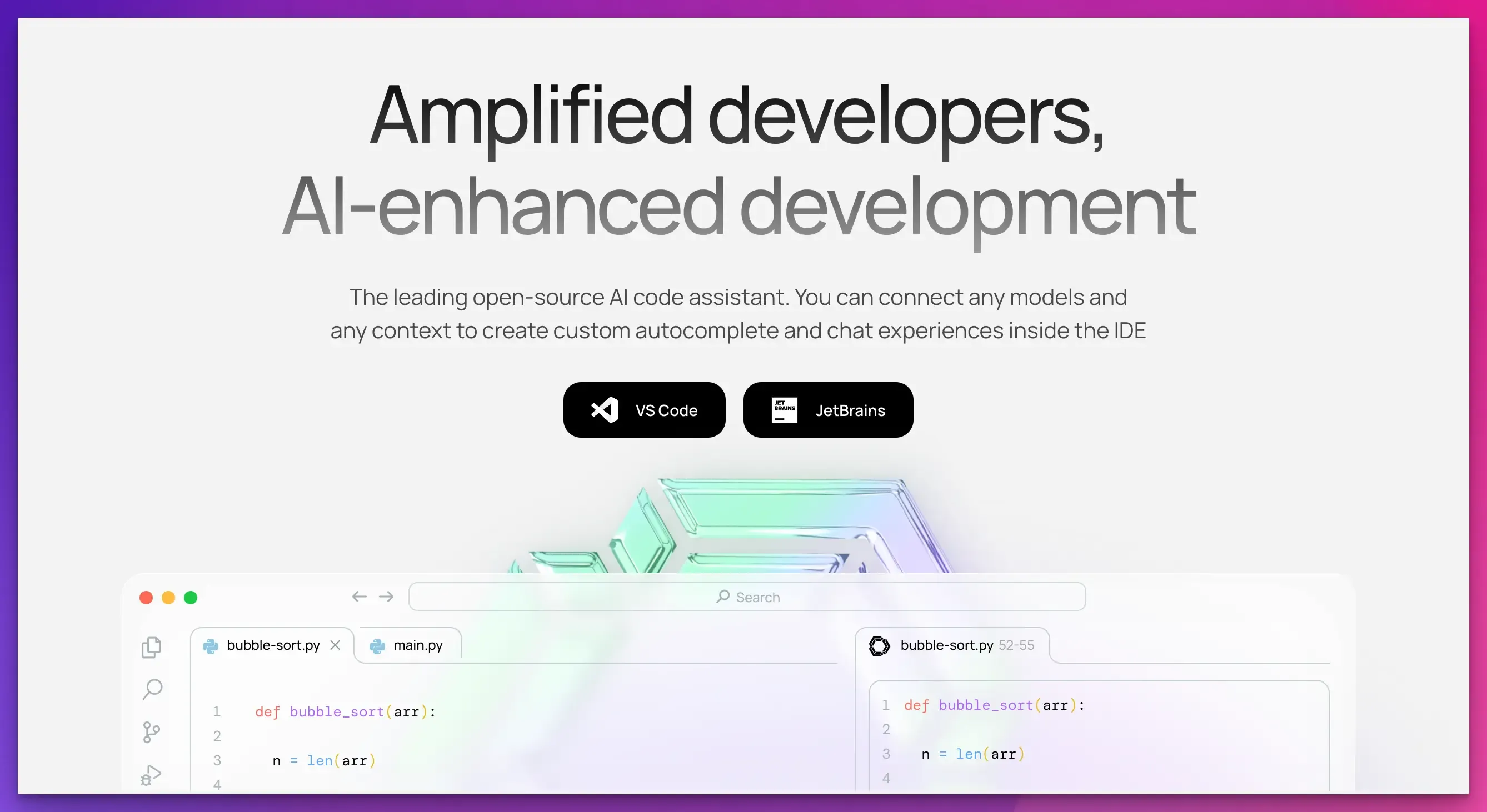
Continue is an open-source AI code assistant that offers a customizable coding experience through features such as autocompletion and chats in your IDE.
It supports a wide range of models, from locally hosted to popular large-language AI models such as Ollama, OpenAI, Together, Azure OpenAI Service, Anthropic, Mistral, and LM Studio.
Key Features:
- Suggests autocompletion for single lines or entire code blocks.
- It offers inline code editing and suggestions as you type.
- The chat interface allows developers to interact with the AI and ask questions about functions, files, or the entire codebase.
- Provides shortcuts for common use cases.
- Works with Visual Studio Code and JetBrains IDEs.
Use Cases:
- Automated code suggestions directly in the IDE.
- Code review and explanation.
- Custom AI development.
Pricing:
- Open-source and free.
- Custom pricing for enterprises.
Aider
Aider is an AI pair programmer tool that allows developers to work with LLMs and edit code directly in their terminals.
It integrates with large language models like GPT-4o and Claude 3.5 Sonnet, allowing developers to collaborate with AI for various coding tasks.
Key Features:
- Allows editing multiple files at once for complex projects.
- Automatically generates commit messages for the version control process.
- Supports popular languages like Python, JavaScript, PHP, HTML, CSS, and more.
- Works well in larger codebases using a map of your entire git repository.
- Allows users to transcribe voice-to-code using voice commands.
Use Cases:
- Pair programming with AI.
- Refactor and debug code.
- Add new features or test cases.
- Start new projects or update docs.
Pricing:
Free.
Pieces
Pieces is an AI-powered tool that enables developers to manage code snippets and optimize their development workflow.
It acts as a central hub where users can save, search, organize, and reuse code snippets more efficiently, making it easier to maintain consistency across projects.
Key Features:
- Allows users to save and organize code snippets for future use.
- Acts as your personal AI copilot to debug, explain, fix, review, and generate code.
- Extracts code from screenshots to reduce manual copying.
- Automatically suggests code optimizations and categorizes saved snippets.
- Tracks changes and provides a history of edits for easier version control.
- Facilitates collaborative development with team members.
- Integrates with popular language models such as Gemini, GPT-4, Llama 2, or Mistral AI.
Use Cases:
- Web development with personalized workflow assistance.
- Manage reusable code across various projects.
- Team collaboration with off-line first architecture.
Pricing:
Free.
Cody
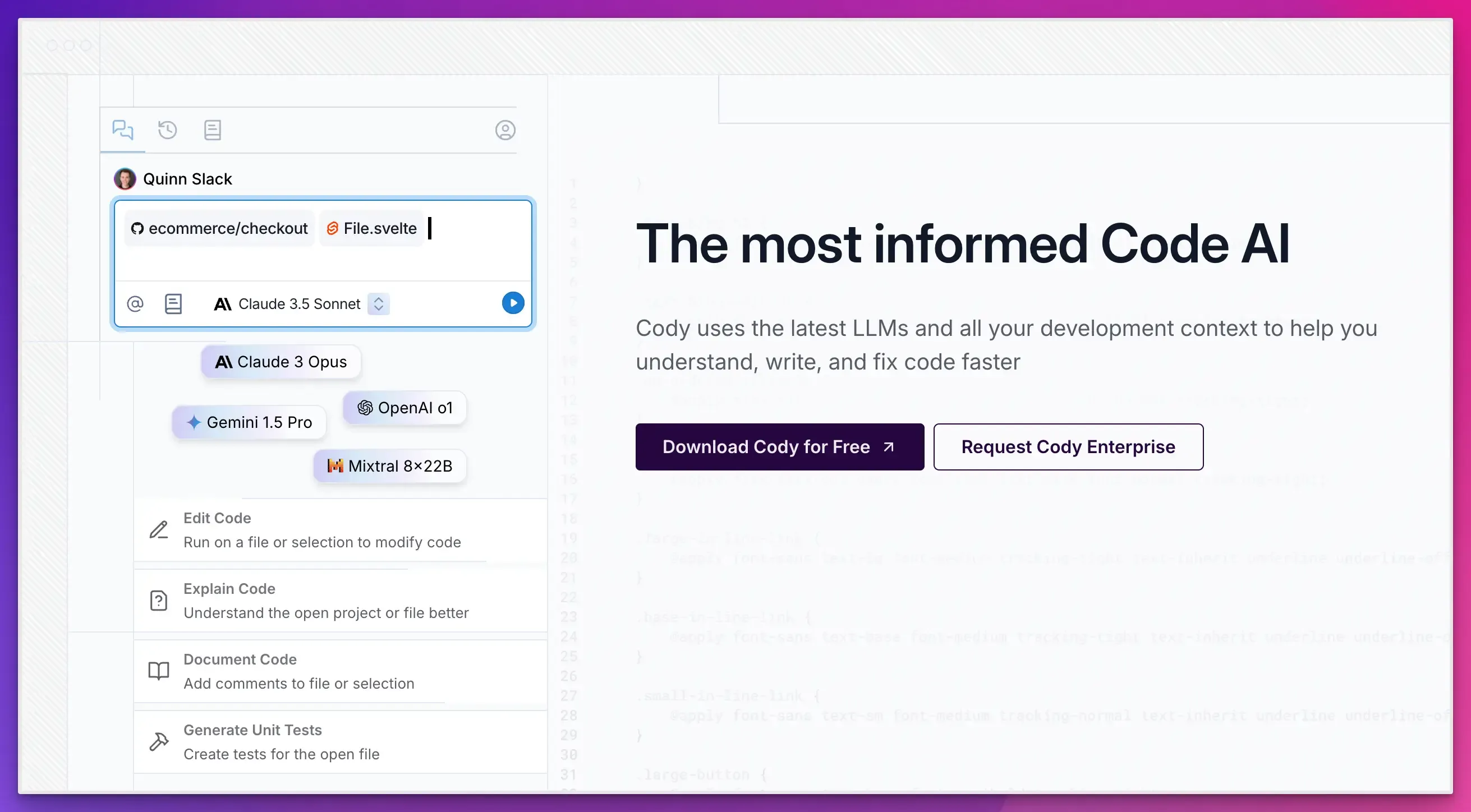
Cody, developed by Sourcegraph, is an AI coding assistant that uses the latest LLMs to help you understand, write, and fix code faster.
It provides AI-powered code completions and editing features directly in you IDE, based on relevant context to deliver the most accurate results.
Key Features:
- Intelligent code search to retrieve context from your entire codebase.
- Provides non-code context by integrating with Notion, Jira, Linear, and more.
- Explains code to help understand the open project or file better.
- Generates unit tests for the source code.
- Integrates with popular language models such as Claude 3 Opus, OpenAI o1, Gemini 1.5 Pro, and Mixtral-8x22B.
- Supports multiple programming languages and works with VS Code, IntelliJ, PyCharm and GoLand.
Use Cases:
- Quickly understand new codebases.
- Automatically generate documentation, unit tests, or new code.
- Identify and suggest bug fixes for easier debugging.
Pricing:
- Free plan available.
- Pricing starts from $9 per month for Cody Pro.
snappify will help you to create
stunning presentations and videos.
Final Words
AI tools are changing the way developers create software.
These tools help improve efficiency, reduce coding errors, and speed up development.
The tools listed here cater to different needs, from improving productivity to following secure code practices, making them invaluable for maintaining high-quality software.
If you like this article, you will also enjoy reading:
- Will AI Replace Programmers?
- AI tools for Technical Writing.
- Best Artificial Intelligence Platforms for Development.
FAQs
Which AI is better than ChatGPT for coding?
GitHub Copilot is a better option for coding tasks because it integrates with VS Code and offers contextual code suggestions. Other alternatives, like Replit AI and Tabnine, are also great for collaboration features and accurate code autocompletion.
What is the difference between an AI code generator and a code assistant?
An AI code generator focuses primarily on creating lines or blocks of code based on a prompt.
On the other hand, a code assistant provides real-time suggestions, code explanations, and help developers through the coding process.
